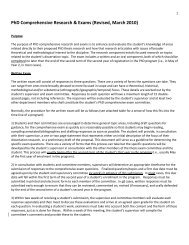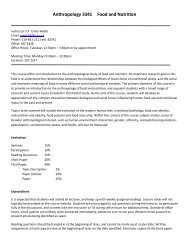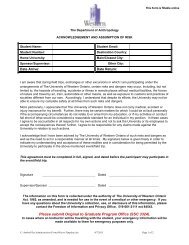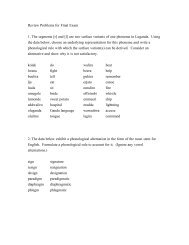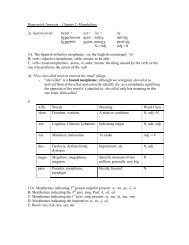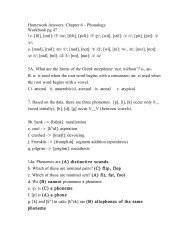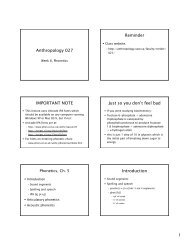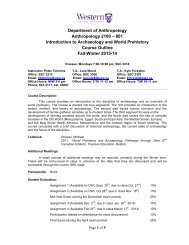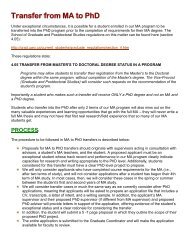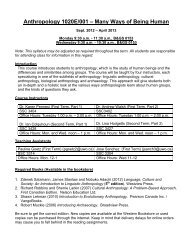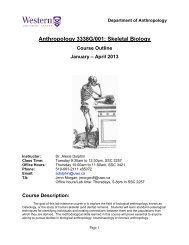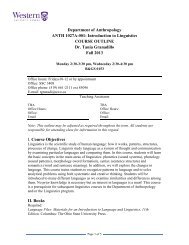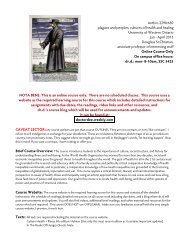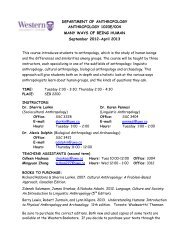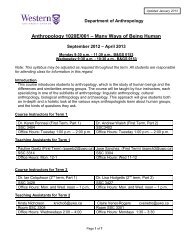Archaeology of Ontario and the Great Lakes - Anthropology
Archaeology of Ontario and the Great Lakes - Anthropology
Archaeology of Ontario and the Great Lakes - Anthropology
You also want an ePaper? Increase the reach of your titles
YUMPU automatically turns print PDFs into web optimized ePapers that Google loves.
Department <strong>of</strong> <strong>Anthropology</strong><br />
<strong>Anthropology</strong> 2233F-001/First Nations Studies 2233F-001<br />
<strong>Archaeology</strong> <strong>of</strong> <strong>Ontario</strong> <strong>and</strong> <strong>the</strong> <strong>Great</strong> <strong>Lakes</strong><br />
Course Outline<br />
Fall 2013<br />
Classes: Wednesdays 7:00 – 10:00 pm SSC 2257<br />
Instructor: Peter Timmins<br />
T.A.: Katie Ma<strong>the</strong>r<br />
Office: SSC 3213 Office: SSC 3301<br />
Email: ptimmins@uwo.ca<br />
Email: kma<strong>the</strong>r9@uwo.ca<br />
Office Hours: M/W 5-6 pm<br />
Office Hours: Tues. 3-4 pm; Th. 11-12 noon<br />
Course Content<br />
This course will review <strong>the</strong> archaeological evidence for <strong>the</strong> history <strong>of</strong> <strong>Ontario</strong> <strong>and</strong> <strong>the</strong> <strong>Great</strong> <strong>Lakes</strong><br />
region prior to <strong>the</strong> arrival <strong>of</strong> Europeans. Topics include a review <strong>of</strong> <strong>the</strong> environmental setting, <strong>the</strong> arrival<br />
<strong>of</strong> Paleo-Indians in <strong>the</strong> <strong>Great</strong> <strong>Lakes</strong> region, <strong>the</strong> development <strong>of</strong> hunting <strong>and</strong> ga<strong>the</strong>ring cultures, <strong>the</strong><br />
appearance <strong>of</strong> agriculture <strong>and</strong> settled village life, <strong>and</strong> <strong>the</strong> development <strong>of</strong> historically known Iroquoian <strong>and</strong><br />
Algonquian societies, such as <strong>the</strong> Huron, <strong>the</strong> Neutral <strong>and</strong> <strong>the</strong> Ojibwa. We will also briefly discuss <strong>the</strong><br />
archaeological record <strong>of</strong> <strong>the</strong> first European settlers to enter <strong>the</strong> <strong>Great</strong> <strong>Lakes</strong> region <strong>and</strong> <strong>the</strong>ir interactions<br />
local First Nations populations. The course will conclude with a discussion <strong>of</strong> recent issues <strong>and</strong> current<br />
trends in <strong>the</strong> archaeology <strong>of</strong> <strong>Ontario</strong> <strong>and</strong> <strong>the</strong> <strong>Great</strong> <strong>Lakes</strong>.<br />
Required Course Readings<br />
As <strong>the</strong>re is no comprehensive text for this course, <strong>the</strong> readings have been selected from journals<br />
<strong>and</strong> books <strong>and</strong> will all be made available on <strong>the</strong> course Webct/Owl page as pdf documents. The readings<br />
are listed in <strong>the</strong> course schedule below. A small number <strong>of</strong> additional readings may be assigned as <strong>the</strong><br />
course progresses.<br />
O<strong>the</strong>r Available Texts:<br />
Relevant books that students may find <strong>of</strong> interest <strong>and</strong> which are available in <strong>the</strong> Weldon Library<br />
include:<br />
<strong>Great</strong> <strong>Lakes</strong> <strong>Archaeology</strong>, by Ronald J. Mason, 2002 (originally 1981). Caldwell, New Jersey,<br />
Blackburn Press.<br />
<strong>Ontario</strong> Prehistory: An 11,000 Year Archaeological Outline, by James V. Wright, 1972,<br />
Ottawa, National Museums <strong>of</strong> Canada.<br />
A History <strong>of</strong> <strong>the</strong> Native People <strong>of</strong> Canada, Volumes I, II <strong>and</strong> III, by James V. Wright, 1995,<br />
1999, 2004, Canadian Museum <strong>of</strong> Civilization Mercury Series Paper 152, Ottawa.<br />
The <strong>Archaeology</strong> <strong>of</strong> Michigan: A Guide to <strong>the</strong> Prehistory <strong>of</strong> <strong>the</strong> <strong>Great</strong> <strong>Lakes</strong> Region, by<br />
James E. Fitting, 1970, New York, Natural History Press.<br />
The <strong>Archaeology</strong> <strong>of</strong> New York State, Revised Edition, by William A. Ritchie, 1969, New York,<br />
Natural History Press.<br />
The <strong>Archaeology</strong> <strong>of</strong> Sou<strong>the</strong>rn <strong>Ontario</strong> to A.D. 1650, edited by Chris Ellis <strong>and</strong> Neal Ferris,<br />
1990, London Chapter, <strong>Ontario</strong> Archaeological Society, Occasional Publication No. 5.
<strong>Anthropology</strong>/FNS 233F/001 September-December 2013<br />
OWL Course Webpage<br />
This course will make use <strong>of</strong> OWL, Western’s online learning system, to provide <strong>the</strong><br />
readings as pdf documents, to make announcements related to <strong>the</strong> course, to provide <strong>the</strong><br />
Research Paper instructions <strong>and</strong> pre-approved topics, <strong>and</strong> for uploading electronic copies <strong>of</strong> your<br />
papers. OWL is found at: https://owl.uwo.ca/portal.<br />
Grading <strong>and</strong> Due Dates:<br />
Grades will be based on a mid-term exam, a paper/book review, a research paper <strong>and</strong> a<br />
final exam, as follows:<br />
Mid-term exam October 23. 2013 in class 30%<br />
Paper/Book Review due October 30, 2013 in class 10%<br />
Research paper due November 20, 2013 in class 30%<br />
Final exam - During <strong>the</strong> final exam period in December. 30%<br />
The exams will consist <strong>of</strong> short answer questions <strong>and</strong> longer essay questions. The final exam will<br />
only cover material presented after <strong>the</strong> mid-term exam.<br />
Paper/Book Review<br />
Students will be required to write a brief review <strong>and</strong> critique <strong>of</strong> an archaeological paper or<br />
book related to <strong>Great</strong> <strong>Lakes</strong> archaeology. A list <strong>of</strong> pre-approved works suitable for review will be<br />
made available on September 25, 2013. Students wishing to review a paper or book that is not<br />
listed may do so with <strong>the</strong> permission <strong>of</strong> <strong>the</strong> instructor. The review will be due in class on October<br />
30, 2013, <strong>and</strong> must also be uploaded to OWL. Reviews are to be 1200–1500 words long <strong>and</strong><br />
follow APA style.<br />
Research Paper<br />
All students are required to submit a paper dealing with a research question in <strong>Great</strong><br />
<strong>Lakes</strong> archaeology. As this is an essay course, completion <strong>of</strong> <strong>the</strong> essay is a course requirement.<br />
Detailed instructions <strong>and</strong> pre-approved paper topics will be made available on OWL on October<br />
2, 2013. All paper topics that are not on <strong>the</strong> pre-approved list must be approved by <strong>the</strong> Instructor.<br />
Papers should be 2000 – 2500 words in length (typed, double-spaced), formatted in APA style,<br />
<strong>and</strong> are due in class on November 20, 2013. You are required to submit both electronic <strong>and</strong> hard<br />
copies <strong>of</strong> your essay. The electronic versions are to be uploaded to <strong>the</strong> class OWL website by <strong>the</strong><br />
due date. All papers should be in <strong>the</strong> general format for writing papers in anthropological<br />
archaeology. This format can be seen in <strong>the</strong> course readings.<br />
Late Policy<br />
Late reviews <strong>and</strong> papers will be penalized 2% per day (including weekends). Late review<br />
<strong>and</strong> papers are to be deposited in <strong>the</strong> drop box outside <strong>the</strong> <strong>Anthropology</strong> Undergraduate <strong>of</strong>fice<br />
(SSC 3326). Reviews <strong>and</strong> papers that are more than two weeks late may not be accepted.
<strong>Anthropology</strong>/FNS 233F/001 September-December 2013<br />
Academic Offences:<br />
Academic <strong>of</strong>fences are taken seriously <strong>and</strong> students are directed to read <strong>the</strong> appropriate<br />
policy, specifically, <strong>the</strong> definition <strong>of</strong> what constitutes a Scholastic Offence, at <strong>the</strong> following Web<br />
site: http://www.uwo.ca/univsec/h<strong>and</strong>book/appeals/schol<strong>of</strong>f.pdf .<br />
Plagiarism: Students must write <strong>the</strong>ir research papers in <strong>the</strong>ir own words. Whenever<br />
students take <strong>and</strong> idea, or a passage from ano<strong>the</strong>r author, <strong>the</strong>y must acknowledge <strong>the</strong>ir debt both<br />
by using quotation marks where appropriate <strong>and</strong> by proper referencing such as footnotes or<br />
citations. Plagiarism is a major academic <strong>of</strong>fence (see Scholastic Offence Policy in <strong>the</strong> Western<br />
Academic Calendar).<br />
All papers may be subject to submission for textual similarity review to <strong>the</strong> commercial<br />
plagiarism detection s<strong>of</strong>tware under license to <strong>the</strong> University for <strong>the</strong> detection <strong>of</strong> plagiarism. All<br />
papers submitted will be included as source documents in <strong>the</strong> reference database for <strong>the</strong> purpose<br />
<strong>of</strong> detecting plagiarism <strong>of</strong> papers subsequently submitted to <strong>the</strong> system. Use <strong>of</strong> <strong>the</strong> service is<br />
subject to <strong>the</strong> licensing agreement, currently between <strong>the</strong> University <strong>of</strong> Western <strong>Ontario</strong> <strong>and</strong><br />
Turnitin.com (http://www.turnitin.com).<br />
Statement on <strong>the</strong> Use <strong>of</strong> Electronic Devices:<br />
As a matter <strong>of</strong> courtesy, please mute phones during lectures. Laptops <strong>and</strong> tablets may be<br />
used for note-taking <strong>and</strong> when <strong>the</strong> instructor makes use <strong>of</strong> online resources during class. If you<br />
wish to record lectures, please seek permission from <strong>the</strong> instructor.<br />
No electronic devices (including but not limited to laptop computers, cell phones, iPods,<br />
etc…) will be allowed during examinations unless expressly authorized by <strong>the</strong> instructor.<br />
Missed Mid-Term Exams:<br />
If, for medical or non-medical reasons, you are unable to write <strong>the</strong> Mid-Term exam you<br />
must contact <strong>the</strong> Instructor, preferably prior to <strong>the</strong> scheduled date <strong>of</strong> <strong>the</strong> exam. You should be<br />
prepared to provide documentation supporting <strong>the</strong> reason for <strong>the</strong> missed exam. In <strong>the</strong> case <strong>of</strong><br />
exams missed for medical reasons, <strong>the</strong> student should refer to <strong>the</strong> UWO Medical Accommodation<br />
Policy found at: (http://www.uwo.ca/univsec/h<strong>and</strong>book/appeals/accommodation_medical.pdf).<br />
Missed Final Exams:<br />
If, for medical or non-medical reasons you are unable to write <strong>the</strong> final exam, you will<br />
require <strong>the</strong> permission <strong>of</strong> <strong>the</strong> Dean <strong>of</strong> <strong>the</strong> student’s home faculty, <strong>the</strong> Instructor, <strong>and</strong> <strong>the</strong> Chair <strong>of</strong><br />
<strong>the</strong> Department <strong>of</strong> <strong>Anthropology</strong> to write a special final exam. You must contact <strong>the</strong> Academic<br />
Counseling Office to request permission to write a special exam <strong>and</strong> obtain <strong>the</strong> necessary form.<br />
The student must ensure that <strong>the</strong> form is signed by <strong>the</strong> Instructor <strong>and</strong> <strong>the</strong> Department Chair<br />
before it is returned to <strong>the</strong> appropriate Academic Counseling Office in <strong>the</strong> Student’s faculty. In <strong>the</strong><br />
case <strong>of</strong> exams missed for medical reasons, <strong>the</strong> provisions <strong>of</strong> <strong>the</strong> UWO Medical Accommodation<br />
Policy apply: (http://www.uwo.ca/univsec/h<strong>and</strong>book/appeals/accommodation_medical.pdf).<br />
Support Services <strong>and</strong> Accessibility<br />
Student Development Services <strong>of</strong>fers a variety <strong>of</strong> academic, personal, <strong>and</strong> career-related<br />
services to assist students. The Student Development Centre is located in Room 4100 <strong>of</strong> <strong>the</strong><br />
Student Services Building <strong>and</strong> <strong>the</strong>ir web site is: http://www.sds.uwo.ca/. Please contact <strong>the</strong><br />
course instructor if you require material in an alternate format or if you require any o<strong>the</strong>r<br />
arrangements to make this course more accessible to you. You may also wish to contact<br />
Services for Students with Disabilities (SSD) at 661-2111, x 82147 for any specific question.
<strong>Anthropology</strong>/FNS 233F/001 September-December 2013<br />
Students who are in emotional/mental distress should refer to Mental Health@Western<br />
http://www.uwo.ca/uwocom/mentalhealth/ for a complete list <strong>of</strong> options about how to obtain help.<br />
The web site for <strong>the</strong> Office <strong>of</strong> <strong>the</strong> Registrar is: http://www.registrar.uwo.ca/.<br />
COURSE OUTLINE (tentative):<br />
Lecture Date<br />
September 11<br />
September 18<br />
September 25<br />
October 2<br />
October 9<br />
Topics <strong>and</strong> Required Readings<br />
Lecture 1: Introduction, Environmental Context, <strong>and</strong> Time-<br />
Space Systematics in <strong>Archaeology</strong><br />
Reading: P.F. Karrow <strong>and</strong> B.G. Warner (1990), The Geological<br />
<strong>and</strong> Biological Environment for Human Occupation in Sou<strong>the</strong>rn<br />
<strong>Ontario</strong>. In The <strong>Archaeology</strong> <strong>of</strong> Sou<strong>the</strong>rn <strong>Ontario</strong> to A.D.<br />
1650. Chapter, p. 5 - 35.<br />
Lecture 2: The Paleo-Indians<br />
Readings: 1) C. J. Ellis, A. C. Goodyear, D. F. Morse <strong>and</strong> K.<br />
Tankersley (1998). <strong>Archaeology</strong> <strong>of</strong> <strong>the</strong> Pleistocene-Holocene<br />
Transition in Eastern North America. Quaternary International<br />
49/50:151-166.<br />
2) Ross, Wm. (1997) The Interlakes Composite: A Re-Definition<br />
<strong>of</strong> <strong>the</strong> Initial Settlement <strong>of</strong> <strong>the</strong> Agassiz-Minong Peninsula. The<br />
Wisconsin Archaeologist, 76 (3-4): 244-268.<br />
Lecture 3: The Early <strong>and</strong> Middle Archaic Periods<br />
Readings: 1) C. J. Ellis, P.A. Timmins <strong>and</strong> H. Martelle (2009). At<br />
<strong>the</strong> Crossroads <strong>and</strong> on <strong>the</strong> Periphery: The Archaic<br />
Archaeological Record <strong>of</strong> Sou<strong>the</strong>rn <strong>Ontario</strong>. In Archaic<br />
Societies: Diversity <strong>and</strong> Complexity across <strong>the</strong><br />
Midcontinent. Read pages 1-26 only.<br />
2) J. O’Shea <strong>and</strong> G.A. Meadows (2009) Evidence for Early<br />
Hunters Beneath <strong>the</strong> <strong>Great</strong> <strong>Lakes</strong>. Proceedings <strong>of</strong> <strong>the</strong> National<br />
Academy <strong>of</strong> Science, U.S.A., 106(25):10120-10123.<br />
Lecture 4: The Late Archaic Period in Sou<strong>the</strong>rn <strong>Ontario</strong> <strong>and</strong><br />
<strong>the</strong> Archaic Period in <strong>the</strong> Upper <strong>Great</strong> <strong>Lakes</strong><br />
Reading: 1) C. J. Ellis, P.A. Timmins <strong>and</strong> H. Martelle (2009). At<br />
<strong>the</strong> Crossroads <strong>and</strong> on <strong>the</strong> Periphery: The Archaic<br />
Archaeological Record <strong>of</strong> Sou<strong>the</strong>rn <strong>Ontario</strong>. In Archaic<br />
Societies: Diversity <strong>and</strong> Complexity across <strong>the</strong><br />
Midcontinent. Read pages 26-42.<br />
Lecture 5: The Early Woodl<strong>and</strong> Period<br />
Reading: 1) M.W. Spence, R. Pihl <strong>and</strong> C. Murphy (1990).<br />
Cultural Complexes <strong>of</strong> <strong>the</strong> Early <strong>and</strong> Middle Woodl<strong>and</strong> Periods.<br />
In The <strong>Archaeology</strong> <strong>of</strong> Sou<strong>the</strong>rn <strong>Ontario</strong> to A.D. 1650. Read<br />
pages 125-142 only.<br />
2) Parker, Bud (1997). The Fitzgerald Site: A Non- Meadowood<br />
Early Woodl<strong>and</strong> Site in Southwestern <strong>Ontario</strong>, Canadian<br />
Journal <strong>of</strong> <strong>Archaeology</strong> 21:121-148.
<strong>Anthropology</strong>/FNS 233F/001 September-December 2013<br />
October 16<br />
October 23<br />
October 30<br />
November 6<br />
November 13<br />
Lecture 6: The Middle Woodl<strong>and</strong> Period<br />
Readings: 1) M.W. Spence, R. Pihl <strong>and</strong> C. Murphy (1990).<br />
Cultural Complexes <strong>of</strong> <strong>the</strong> Early <strong>and</strong> Middle Woodl<strong>and</strong> Periods.<br />
In The <strong>Archaeology</strong> <strong>of</strong> Sou<strong>the</strong>rn <strong>Ontario</strong> to A.D. 1650. Read<br />
pages 142-169.<br />
2) Reid, C.S. "Paddy" <strong>and</strong> Grace Rajnovich (1991).<br />
Laurel: a re-evaluation <strong>of</strong> <strong>the</strong> spatial, social <strong>and</strong> temporal<br />
paradigms. Canadian Journal <strong>of</strong> <strong>Archaeology</strong> 15:193-234.<br />
Mid-term exam in class<br />
Lecture 7: Transitional Woodl<strong>and</strong>/Late Woodl<strong>and</strong> I<br />
[Paper Review due in class]<br />
Readings: 1) N. Ferris <strong>and</strong> M. Spence (1995). The Woodl<strong>and</strong><br />
Traditions in Sou<strong>the</strong>rn <strong>Ontario</strong>. Revista de Arqueologia<br />
Americana (Journal <strong>of</strong> American <strong>Archaeology</strong>) 9:83-122.<br />
Read pages 102-106 only.<br />
2) Gary Warrick (2000): The Precontact Iroquoian Occupation <strong>of</strong><br />
Sou<strong>the</strong>rn <strong>Ontario</strong>. Journal <strong>of</strong> World Prehistory (14-4: 415-466).<br />
Read pages 416–434 only.<br />
Lecture 8: Late Woodl<strong>and</strong> II<br />
Readings: 1) N. Ferris <strong>and</strong> M. Spence (1995). The Woodl<strong>and</strong><br />
Traditions in Sou<strong>the</strong>rn <strong>Ontario</strong>. Revista de Arqueologia<br />
Americana (Journal <strong>of</strong> American <strong>Archaeology</strong>) 9:83-125.<br />
Read pages 106-109.<br />
2) G. Warrick (2000). The Precontact Iroquoian Occupations <strong>of</strong><br />
Sou<strong>the</strong>rn <strong>Ontario</strong>. Journal <strong>of</strong> World Prehistory 14(4):415-466.<br />
Read pages 434-438 only.<br />
Optional but recommended readings:<br />
3) D. Snow: Migration in Prehistory: The Nor<strong>the</strong>rn Iroquoian<br />
Case. American Antiquity (1995) 60 (1): 59-79.<br />
4) G. Crawford & D. Smith: Migration in Prehistory: Princess<br />
Point <strong>and</strong> <strong>the</strong> Nor<strong>the</strong>rn Iroquoian Case. American Antiquity<br />
(1996) 61 (4): 782-790.<br />
5) D. Snow: More on Migration in Prehistory. American<br />
Antiquity (1996) 61(4): 791-796.<br />
6) J. Hart <strong>and</strong> H.J. Brumbach: The Death <strong>of</strong> Owasco. American<br />
Antiquity (2003) 68 (4): 737-752.<br />
Lecture 9: The Late Woodl<strong>and</strong> II (cont…)<br />
Readings: 1)N. Ferris <strong>and</strong> M. Spence (1995). The Woodl<strong>and</strong><br />
Traditions in Sou<strong>the</strong>rn <strong>Ontario</strong>. Revista de Arqueologia<br />
Americana (Journal <strong>of</strong> American <strong>Archaeology</strong>) 9:83-125. (p.<br />
109-115)<br />
2) G. Warrick (2000). The Precontact Iroquoian Occupations <strong>of</strong><br />
Sou<strong>the</strong>rn <strong>Ontario</strong>. Journal <strong>of</strong> World Prehistory 14(4):415-466.<br />
Read pages 439-446 only.<br />
3) N. Ferris <strong>and</strong> J. Wilson (2009) The <strong>Archaeology</strong> <strong>of</strong> a Late<br />
Woodl<strong>and</strong> Borderl<strong>and</strong> in Southwestern <strong>Ontario</strong>. Academia.edu<br />
(online publication)
<strong>Anthropology</strong>/FNS 233F/001 September-December 2013<br />
November 20<br />
November 27<br />
December 4<br />
Lecture 10: The Terminal Woodl<strong>and</strong> Period<br />
[Research Paper due in class]<br />
Readings: 1) N. Ferris <strong>and</strong> M. Spence (1995). The Woodl<strong>and</strong><br />
Traditions in Sou<strong>the</strong>rn <strong>Ontario</strong>. Revista de Arqueologia<br />
Americana (Journal <strong>of</strong> American <strong>Archaeology</strong>) 9:83-125.<br />
Read pages 115-122 only.<br />
2) G. Warrick (2000). The Precontact Iroquoian Occupations <strong>of</strong><br />
Sou<strong>the</strong>rn <strong>Ontario</strong>. Journal <strong>of</strong> World Prehistory 14(4):415-466.<br />
Read pages 446-458 only.<br />
3) Birch, J. (2012) Coalescent Communities: Settlement<br />
Aggregation <strong>and</strong> Social Integration in Iroquoian <strong>Ontario</strong>.<br />
American Antiquity, Vol. 77(4):646-670.<br />
4) Engelbrecht, William (1985) New York Iroquois Political<br />
Development. In Culture in Contact: The European Impact on<br />
Native Cultural Institutions in Eastern North America, A.D.<br />
1000 – 1800, W.W. Fitzhugh (ed.), p. 163-183.<br />
Lecture 11: Europeans - Native - North American<br />
Interactions <strong>and</strong> Nineteenth Century Euro-Canadian<br />
<strong>Archaeology</strong><br />
Readings: 1) N. Ferris <strong>and</strong> M. Spence (1995). The Woodl<strong>and</strong><br />
Traditions in Sou<strong>the</strong>rn <strong>Ontario</strong>. Revista de Arqueologia<br />
Americana (Journal <strong>of</strong> American <strong>Archaeology</strong>) 9:83-125.<br />
Read pages 122-125 only.<br />
2) Konrad, Victor. (1981). An Iroquois frontier: <strong>the</strong> north shore <strong>of</strong><br />
Lake <strong>Ontario</strong> during <strong>the</strong> late seventeenth century. Journal <strong>of</strong><br />
Historical Geography, Vol. 7 (2): 129-144.<br />
3) Eva MacDonald (1997), The Root <strong>of</strong> <strong>the</strong> Scatter: Nineteenth<br />
Century Artifact <strong>and</strong> Settlement Patterns in Rural <strong>Ontario</strong>.<br />
<strong>Ontario</strong> <strong>Archaeology</strong>, No. 64: 56-80.<br />
Lecture 12: New Perspectives <strong>and</strong> Current Issues in <strong>the</strong><br />
<strong>Archaeology</strong> <strong>of</strong> <strong>Ontario</strong> <strong>and</strong> <strong>the</strong> <strong>Great</strong> <strong>Lakes</strong><br />
Readings: 1) Kostalena Michelaki (2007) More than Meets <strong>the</strong><br />
Eye: Reconsidering Variability in Iroquoian Ceramics, Canadian<br />
Journal <strong>of</strong> <strong>Archaeology</strong> 31: 143–170.<br />
2) Watts, C., C. White <strong>and</strong> F. Longstaffe (2011) Childhood Diet<br />
<strong>and</strong> Western Basin Tradition Foodways at <strong>the</strong> Kreiger Site,<br />
Southwestern <strong>Ontario</strong>. American Antiquity 76(3):446-472.<br />
3) C. Meghan <strong>and</strong> J. O’Shea (2006) Bear’s Journey <strong>and</strong> <strong>the</strong><br />
Study <strong>of</strong> Ritual in <strong>Archaeology</strong>. American Antiquity 71(2):261-<br />
282.



